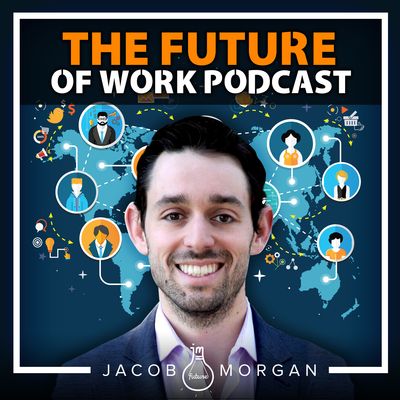Jacob Morgan is a best-selling author, speaker, and futurist who explores what the future of work is going to look like. The goal of the show is to future-proof your career and your organization by giving you the insights you need to adapt to how the workplace is changing. Jacob accomplishes this by sitting down with Chief Human Resource Officer, CEOs, CIOs, and other business leaders to explore topics ranging from technology, millennials, workplace design, employee experience, collaboration, the freelance economy, human resources, careers, and much more. This will be your go-to podcast for understanding how the world of work is changing! Intro and outro music by the amazing Ronald Jenkees!
https://thefutureorganization.com
The New Geography Of Jobs
Click Here to Subscribe via iTunes
Click Here to Subscribe via RSS Feed (non-iTunes feed)
http://traffic.libsyn.com/futureofworkpodcast/enrico20moretti_podcast_done.mp3 What is in this episode and why you should care: Enrico Moretti is a professor of Economics at the University of California, Berkeley. His research covers the fields of labor economics and urban economics. Professor Moretti’s book, “The New Geography of Jobs”, was awarded the William Bowen Prize for the most important contribution toward understanding public policy and the labor market. His research has been covered by The New York Times, The Wall Street Journal, The Washington Post, Forbes, The Atlantic, Businessweek, The Economist, The New Republic, CNN, PBS and NPR. He lives in San Francisco with his wife and the son. When considering the overall ‘health’ of the US economy, Professor Moretti believes that it is generally good. Compared to the time period of the great recession, job creation has picked up. Additionally, within the last six months, wages have picked up. When asked about how to assess the ‘health’ of the economy, he suggests that rather than look at day-to-day changes, such as the media, focus on the yearly changes. That gives a more realistic perspective. Overall, American’s with a high school diploma have found their wages reduced by 20% and are less well off than the previous generation. On the other hand, those with associate’s college degrees or above– are doing better each passing year. This includes their standard of living, not only salaries but future outlook, their overall assets, and even their marital stability. This has created significant differences in earnings between those with more education and those with less. In fact, 30 years ago, it was less than a 40% spread; now it’s more than double – at 80%. For the past 30 years the US has been losing 350,000 blue collar positions in manufacturing per year. A change that is not just a US phenomenon, but is also found in other advanced countries – such as Japan and Germany. This has been predominantly based on increased automation in factories Automation – robots, artificial intelligence – has had a profound effect on jobs. The new technology and automation have changed the face of jobs in manufacturing plants. Fewer people are required and instead of blue collar workers, they are highly skilled engineers. This change has lead to an increased need for higher skilled workers. When asked about the US cities that have undergone the most amount of change in the past 30 years, Moretti cited three that have had positive transformations: Austin, Texas, Raleigh/Durham, North Carolina and Seattle, Washington. Each of these has become an area of global innovation, has an availability of an excellent work force and also provides high wages. In contrast, those he sees struggling are found in the ‘rust-belt’. For example, Detroit and Flint, Michigan as well as Rochester, New York, which have lost population due to a reduction in the need for traditional manufacturing jobs and therefore, lower wages and innovation. Specifically, Moretti has found that the US can be divided into ‘three Americas’. 1. American Brain Hubs – strong workers with more than 40% of the population which holds a college degree. These include cities such as Boston, New York City and San Francisco. These cities are productive, innovative and provide higher salaries. 2. Former Manufacturing – struggling, shrunk in size, lost in terms of aggregate population. 3. Neither Brain Hub nor Former Manufacturing – maintaining current productivity and fairly stable population What you will learn in this episode:Why one tech job can increase the economy by multiples
Why cities with more college graduates are beneficial to all
Why the ecosystem of a city matters
The current ‘health’ of US economy
What effects AI and Automation have had on jobs
The differences in labor markets across different cities
What cities Enrico is paying attention to that are going through big changes
Enrico’s thoughts on universal basic income
My new book, The Employee Experience Advantage (Wiley, March 2017) analyzes over 250 global organizations to understand how to create a place where people genuinely want to show up to work. Subscribe to the newsletter here.
The post The New Geography Of Jobs appeared first on Jacob Morgan.
